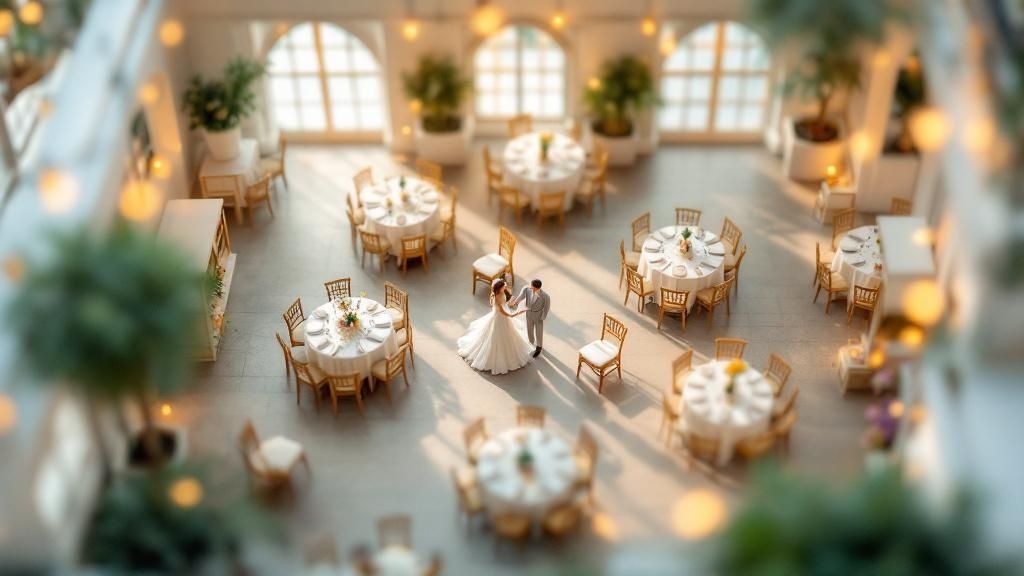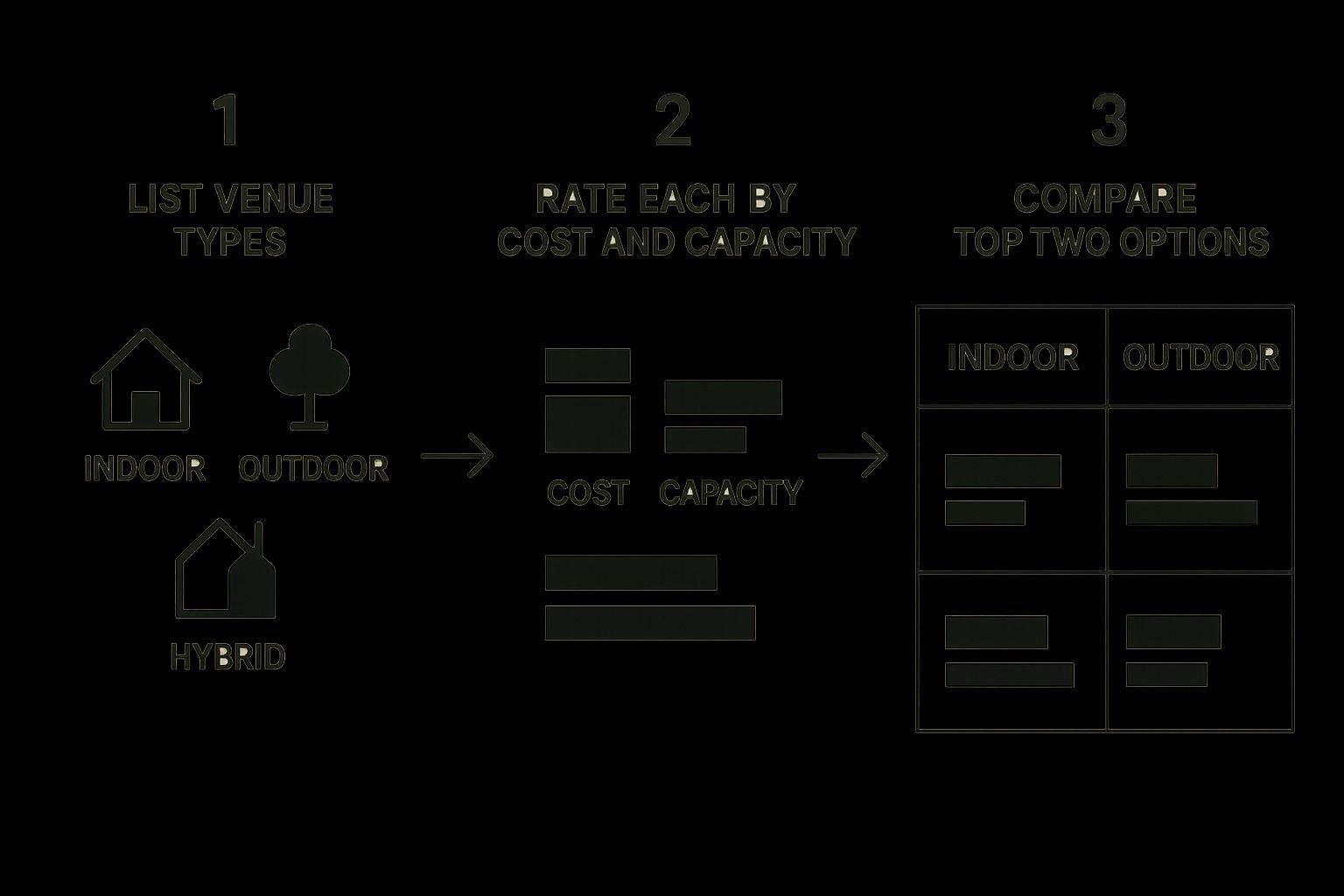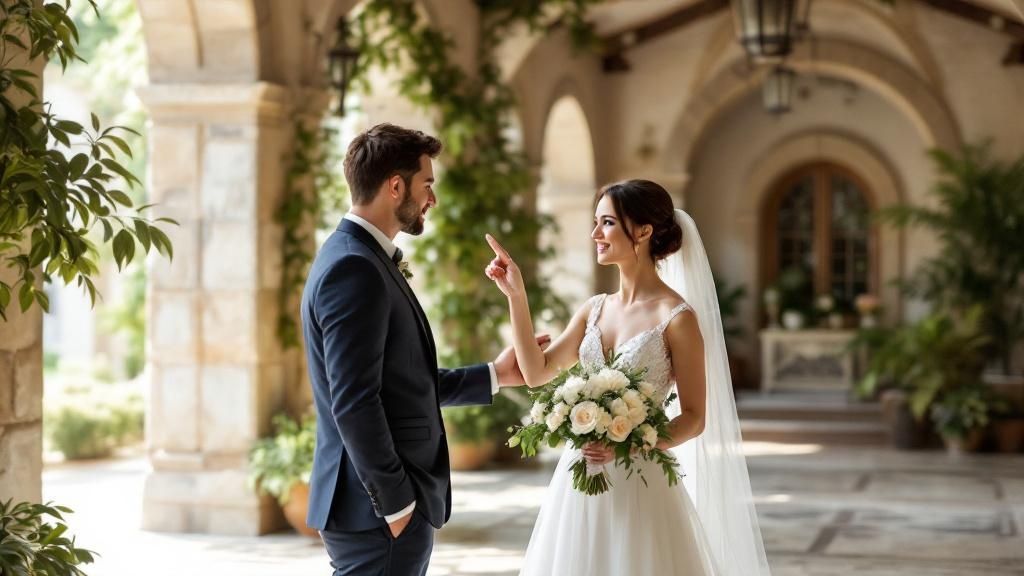Alright, let's be real for a second. Picking your wedding venue is the first big domino to fall in the whole planning game. Get this right, and everything else—from your budget to the overall vibe—snaps into place so much more easily. It’s more than just a pretty room; it's the backdrop for one of the biggest days of your life.
First Things First: Your Vision and Your Budget

Before you fall down the rabbit hole of venue websites and Instagram feeds, you and your partner need to sit down for a chat. No spreadsheets yet. This is about dreaming. What does your perfect day actually feel like?
Are we talking a chill, rustic barn party with fairy lights everywhere? Or is it a full-on glamorous affair in a historic ballroom dripping with crystal? Maybe you're both foodies who'd love an intimate buyout of a chic city restaurant, or perhaps a sun-drenched celebration at a winery is more your speed. Nailing down your preferred style is the single best way to cut through the noise and start your search with focus.
Marrying Your Dreams to Your Dollars
Once you’ve got the vibe locked in, it's time for the money talk. I know, it can be a bit awkward, but trust me, getting this out of the way now will save you so much stress down the line. Have an open conversation about what you can realistically spend, including any help you might be getting from family.
Setting a firm budget from the get-go prevents the absolute heartbreak of falling in love with a place you simply can't afford. And remember, that initial venue fee is just the beginning. You also have to factor in costs like:
- Food and drinks (this is a big one!)
- Tables, chairs, and linens if they aren't included
- Music, flowers, and other decor
- Staffing, service charges, and taxes
A great way to ground your search is to figure out a rough cost-per-guest. For example, if your total budget is $30,000 for 150 guests, that breaks down to $200 per person. Suddenly, when you see a venue’s all-inclusive package at $250 per person, you know immediately whether to dig deeper or move on. It’s a simple trick that keeps your search realistic from day one.
Insider Tip: From my experience, the venue and catering will almost always eat up 40-50% of your total wedding budget. Knowing this helps you set a clear price range for your venue hunt and keeps your spending expectations in check for everything else.
Your Guest Count is King
The number of people you invite has a massive impact on your venue options. Industry data shows that a typical wedding might have around 141 guests, while destination weddings are often smaller, hovering closer to 86. Interestingly, some wedding statistics from Wedded Wonderland even suggest a link between lower wedding spending and longer-lasting marriages—something to think about!
A smaller guest list can be a blessing in disguise. It unlocks a whole world of unique, non-traditional venues that simply can't handle a huge crowd. Plus, it frees up your budget for other priorities. You could splurge on that incredible band or invest in a top-notch DJ setup, which often requires a professional wedding sound system rental to truly make an impact.
Nailing Down Your Venue Must-Haves
Okay, you’ve got a handle on your budget and a vision for your wedding style. Now it's time to get down to the nitty-gritty. This is where you draw a line in the sand between your absolute deal-breakers and the things that would just be nice to have.
Getting this straight from the start will save you from a world of headaches and wasted weekends. Think of it as your own personal GPS for the venue hunt—it’ll keep you from getting sidetracked by gorgeous places that just aren't a practical fit.
The Big Three: Where Your Search Really Begins
Before you fall in love with a photo on Instagram, you need to lock in three key details. Honestly, your entire search hinges on these.
-
Guest Count: Get real about your guest list. Who absolutely has to be there (the A-list) and who would be great to include if space and budget allow (the B-list)? You need a solid maximum number. A venue might claim it holds 200 people, but you have to ask how. Is that for a formal sit-down dinner, or is it 200 people crammed in like sardines for a standing-room-only cocktail party? Always clarify capacity for your kind of event.
-
Location: How far are you willing to ask your friends and family to travel? Think about the guest experience. A chic downtown loft is amazing, but what’s the parking situation? That rustic barn in the countryside is stunning, but will you need to arrange shuttle buses? This decision sets the tone for the entire day.
-
Date: Are you dead-set on a Saturday in peak season, or could a Friday in November work? Being flexible with your date is probably the single biggest way to save money. Venues often offer major discounts for off-season dates or non-Saturday weddings, which can free up thousands in your budget.
The growing trend of destination weddings really drives home how important location is. The market is expected to balloon to $47.69 billion by 2025 as more couples look for unique settings and experiences to share. It shows that the venue isn't just a backdrop anymore—it's a core part of the story. You can read more about this trend and its impact on the wedding industry from GlobeNewswire.
Separating Your Needs From Your Wants
Grab a piece of paper or open a new note on your phone and make two columns: "Must-Haves" and "Nice-to-Haves." It’s time for some brutal honesty. This isn't about what Pinterest tells you a wedding should have; it’s about what you two genuinely need to make your day feel right.
For instance, if your grandmother uses a wheelchair, then full accessibility is a non-negotiable must-have. No ramps or accessible restrooms? That venue is off the list. Period. But what about an on-site bridal suite? That's probably a "nice-to-have." It’s super convenient, sure, but you could always get ready at a nearby hotel if the perfect venue doesn't have one.
Here's a simple test: If you can picture your wedding day being absolutely perfect without it, it’s a "nice-to-have." If its absence would create a major problem or prevent someone important from celebrating with you, it's a "must-have."
Getting this on paper is a surprisingly powerful exercise. Here are a few more real-world examples to get you started:
- Must-Have: The freedom to bring in your own caterer because your heart is set on a specific food truck.
- Nice-to-Have: A dedicated outdoor space for cocktail hour.
- Must-Have: A built-in sound system because you're planning an epic dance party.
- Nice-to-Have: A pet-friendly policy so your dog can be the ring bearer.
This process gives you incredible focus. You start to see what truly shapes the experience, like making sure the atmosphere is just right. You might realize that great lighting is key to your vision, making it a must-have. A little research into the power of up-lighting for wedding receptions can completely change how you look at a space. Once your priorities are crystal clear, you can search for a venue with true confidence.
Starting Your Venue Search Like a Pro

Okay, you've got your vision, your budget, and a list of must-haves. Now for the fun part: the actual hunt. It’s easy to get lost in a sea of wedding websites, so let's be strategic about this. The goal here is to build a solid "longlist" of about 5-7 venues that look great on paper before you start booking tours.
Look Beyond the Usual Suspects
The big venue finders are a decent place to start, but the real gems are often found elsewhere. Honestly, social media is your secret weapon for this.
-
Instagram Location Tags: This is my favorite trick. Don't just scroll through a venue's perfectly polished feed. Instead, click on their location tag. You'll see tons of real, unfiltered photos from actual weddings, which gives you a much better feel for the space, the lighting, and how other couples made it their own.
-
Hashtag Deep Dive: Get specific with your searches. Try things like
#[City]WeddingVenueor even#[VenueName]Wedding. This is a fantastic way to discover photographers, florists, and other vendors who’ve worked at that venue. Their portfolios give you even more angles and ideas to look at.
The Power of a Spreadsheet
Trust me on this one. After looking at a few places, your browser tabs will multiply, and everything will start to blur together. This is where a simple spreadsheet becomes your best friend. You don't need anything fancy, just a way to track the basics for your top contenders.
Create a simple tracking sheet with these columns: Venue Name, Capacity, Location, Base Rental Fee, What's Included (like tables, chairs, linens), and a "Notes" column for your gut feelings. It makes comparing your options so much easier later on.
This initial research is more important than ever. The wedding industry is massive—the global market was estimated at $899.64 billion in 2024 and is only getting bigger. This boom means venues are getting more competitive, often bundling more services to stand out. Knowing what’s included from the get-go is key to comparing apples to apples. If you're curious, you can discover more about the growing wedding services market from Grand View Research.
Don't Underestimate Word of Mouth
Finally, don't forget to tap into your own network. Talk to friends or family who got married recently. Ask for their brutally honest opinions about their venue. They’ll give you the real scoop—the good, the bad, and the stuff they wish someone had told them. That kind of firsthand experience is gold and something you'll never find in a glossy brochure.
Getting the Most from Your Venue Tours
Alright, this is where the fun really begins. After all that online research, you finally get to see your top- contenders in person. A venue tour is your opportunity to see if a space actually feels right, beyond the perfectly curated photos. Think of it less like a casual walkthrough and more like an investigative mission—your goal is to uncover every single detail that could impact your wedding day.
It's so easy to get swept up in the moment. You walk into a stunning ballroom or a beautiful garden and immediately start picturing your wedding there. But hold on! Stay focused. You're here to gather the facts and truly get a feel for the atmosphere.

This kind of visual breakdown can be a lifesaver, helping you see at a glance how different venue types stack up against your specific budget and guest count. It's a quick way to keep your choices grounded in reality.
Digging Deeper on Your Walkthrough
Showing up with a list of smart questions is a game-changer. The venue coordinator is your most valuable resource, so don’t be afraid to ask about anything and everything. The more you know now, the fewer surprises you'll have later.
To make sure you don't miss anything, it helps to have a checklist ready. I've put together a table of the most crucial questions I've learned to ask over the years. Print this out, save it to your phone—whatever you need to do to have it handy on every single tour.
Key Questions for Your Venue Walkthrough
| Category | Question to Ask | Why This Detail Is Crucial |
|---|---|---|
| Logistics & Weather | What's your Plan B for bad weather? Where do we go if it rains, and is there an extra cost for the backup space? | This is non-negotiable for any outdoor element. A vague answer is a major red flag. |
| Vendors & Staffing | Can we bring in our own vendors, or do we have to use your exclusive list? Who will be my point of contact on the wedding day? | This determines your freedom of choice and budget. You need to know who is running the show on the day itself. |
| Financials | Can you walk me through a sample invoice? What are all the potential "hidden fees"—like cake cutting, service charges, or overtime? | This prevents sticker shock. You need to understand the all-in cost, not just the base rental fee. |
| Guest Experience | Where is the parking, is it free, and is it well-lit? What is the condition and accessibility of the restrooms? | These "small" details have a huge impact on your guests' comfort and overall experience. |
| Timing & Access | How early can my vendors arrive for setup, and how late do we have to be out of the space? | This directly affects your timeline and the complexity of your decor and entertainment setup. |
Having these answers makes comparing venues apples-to-apples so much easier. You'll quickly see which location offers the most value and aligns best with your vision.
Understanding all these moving parts is also key to building a realistic schedule. These details will heavily influence your event's flow, so it’s smart to start thinking about it now. For a complete guide, take a look at our post on crafting the perfect wedding reception timeline to see how it all fits together.
Look Beyond the Ballroom
The main event space is obviously important, but it's the little things that really shape the guest experience. As you walk through the venue, make a point to investigate the areas that are often overlooked during a tour.
My Favorite Pro Tip: If you can, try to schedule your tour for the same time of day as your planned wedding. This gives you a much better sense of the natural lighting, how the sunset looks on the property, and the overall ambiance you'll actually have.
Pay close attention to the things your guests will notice. Are the bathrooms clean, modern, and easy to find? Is there plenty of parking that's easy to navigate, or will grandma have a confusing, quarter-mile walk in the dark? Look at the general state of the entire property, not just the polished "showcase" rooms. Chipped paint and worn carpets in the hallways are telling.
Don't Forget the People
Last but not least, pay attention to the vibe you get from the staff. How do they treat you during the tour? Are they genuinely warm and helpful, or do you feel like just another number?
The service you get during this initial meeting is almost always a preview of what you and your guests can expect on the wedding day. A team that makes you feel heard, respected, and excited from the very beginning is a team you can trust to bring your day to life.
Decoding the Contract Before You Sign

You found it! The venue feels perfect, the date is open, and you’re already picturing the celebration. Before you pop the champagne, there's one last—and incredibly important—step: the contract. Now’s the time to put on your detective hat and get cozy with the fine print.
Don't let the legal-speak scare you off. Seriously, getting to know your venue contract is the single best way to protect your investment and avoid any nasty surprises down the road. To get comfortable with the process, here’s a great guide on how to read contracts without a law degree.
Key Clauses to Scrutinize
Think of the contract as the official playbook for your wedding. A few key sections hold most of the financial and logistical weight, so you’ll want to give them some extra attention.
- Payment Schedule: This breaks down exactly when your payments are due. Note the deposit amount, the timeline for future installments, and when the final balance must be paid.
- Cancellation Policy: Life happens. What are the financial penalties if you have to cancel or postpone? Dig into this to see if any part of your deposit is refundable and under what circumstances.
- Vendor Restrictions: Does the venue lock you into their "preferred" or "exclusive" vendor list? This is a huge one, as it can limit your choices for catering, photography, and entertainment.
- Insurance Requirements: Most venues will require you to get event liability insurance. The contract should spell out the exact coverage amount you need to secure.
- Force Majeure: This clause covers "acts of God"—unforeseeable events like a hurricane or, yes, a pandemic—that could make holding your event impossible. This has become more critical than ever.
The Golden Rule: If it's not in the contract, it doesn't exist. Any verbal promises the coordinator made—like an extra hour for cleanup or permission to hang your own decor—must be added in writing to the final agreement.
The Art of Negotiation
While some terms are non-negotiable, other areas might have a bit of wiggle room. It never hurts to ask! You might be able to negotiate small perks, especially if you’re booking on an off-peak day or during a slower season.
For instance, you could ask if they’d be willing to waive the cake-cutting fee or let your vendors come in an hour early for setup. Maybe you want to bring in specific wedding uplighting colors that aren't on their standard list.
The worst they can do is say no. But a polite, friendly ask can often score you a welcome little bonus. This final review protects both you and the venue, paving the way for a partnership that feels solid and leads to a fantastic wedding day.
Still Have Questions? Let's Talk Venue FAQs
Even with the most organized binder and a color-coded spreadsheet, a few nagging questions always pop up. It's totally normal. Think of this as your final gut-check before you sign on the dotted line, making sure you move forward with total confidence.
Let's dive into some of the most common questions and worries couples face right before they commit. You're not alone in wondering about these things!
How Far in Advance Should I Really Book a Venue?
Honestly? As soon as humanly possible. If you’ve got your heart set on a popular venue and a peak-season Saturday (think June or October), you need to be looking 12 to 18 months in advance. I’m not kidding—those prime dates get snatched up fast.
Now, if you have a bit of wiggle room, you might not need to be quite so aggressive. Considering a Friday or Sunday celebration, or maybe an off-season date, can open up a lot more options. In that case, booking 9 to 12 months out is usually a safe bet. The real key is to start your search the moment you’ve nailed down your budget and have a rough guest count.
What Hidden Costs Are Going to Bite Me Later?
This is a big one. That initial number you see on the brochure is almost never what you'll actually pay. Before you fall head-over-heels for a place, you absolutely must ask for a detailed, itemized proposal.
Here are the usual suspects that can sneak up on you:
- Service Charges & Gratuity: This is the most common shocker. Expect a 20-25% charge to be added right on top of your entire food and beverage bill. It's not optional.
- Cake-Cutting Fees: Found the perfect baker? Great! But your venue might charge you a per-person fee just to slice and serve the cake you brought in.
- Corkage Fees: The same logic applies to wine. If you bring your own bottles, the venue will charge a "corkage fee" for each one they open.
- Overtime Charges: If your celebration is just too good to end, be careful. Going even a few minutes past your contracted time can trigger some seriously steep overtime fees for staff and the space.
- Surprise Mandatory Fees: Things like security, a coat check attendant, or even a "required venue manager" can sometimes be non-negotiable add-ons you didn't see coming.
A truly great venue will be upfront and transparent about all of this from day one. If getting straight answers about extra costs feels like pulling teeth, consider that a major red flag.
What if We Found "The One" but It's a Little Over Budget?
First, don't panic! If a venue ticks all your boxes but the price tag is making you sweat, you might still have some wiggle room. It never hurts to have a frank, polite conversation with the venue coordinator.
Ask if there's any flexibility. You could inquire about potential discounts for booking on a less popular day, like a Friday or Sunday, or during their off-season (think January or March). Since the food and beverage cost is usually the biggest chunk of the bill, see if they offer more budget-friendly catering packages or bar options. Sometimes, a small tweak is all it takes to make the numbers work.
In-House Caterer or Bring My Own Vendors?
Ah, the classic debate: convenience versus customization. There’s no right answer here, only what's right for you.
Going with a venue that has an in-house caterer and offers all-inclusive packages can be a lifesaver. It streamlines the whole process, reduces the number of contracts you have to manage, and can seriously lower your stress levels.
On the flip side, a venue that lets you bring in outside vendors gives you total freedom. You can hire that awesome food truck you've been following on Instagram or bring in a caterer who specializes in the exact cuisine you're dreaming of.
This choice also affects your other creative partners. An all-inclusive spot might have a list of preferred photographers, but your vision might not align with their style. It’s so important to find the right creative team, so check out our guide on how to choose a wedding photographer to see why that freedom can be priceless.
And don't forget logistics! A seamless wedding day involves more than just a great venue. You'll want to look into reliable wedding car hire options to make sure everyone arrives on time and in style.
Ready to bring your vision to life? At 1021 Events, we’re experts at turning beautiful spaces into unforgettable parties. With professional DJ services, stunning uplighting, and custom event production, we'll help you create the perfect atmosphere for your big day. Learn more about how we can elevate your celebration at 1021 Events.




